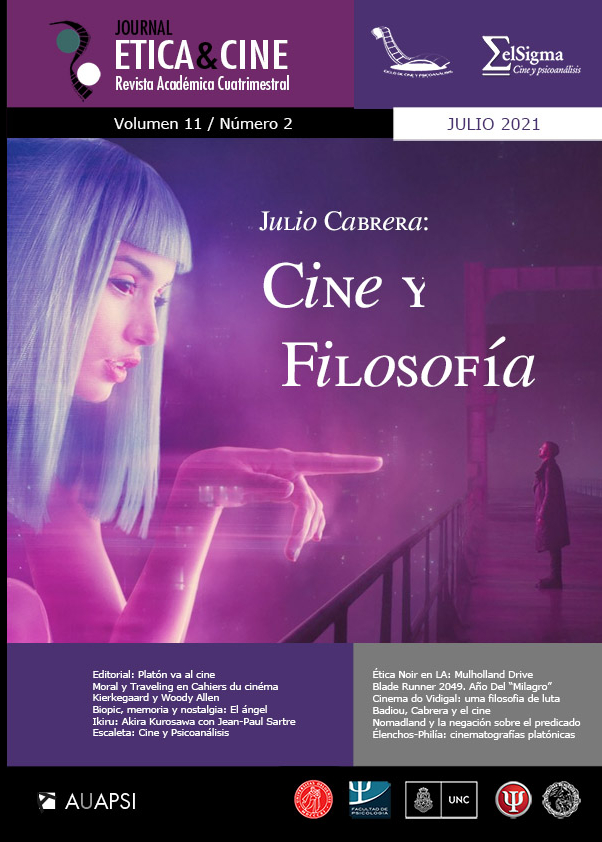Moral and Traveling Ethical commitment and formal statements in Cahiers du cinéma
DOI:
https://doi.org/10.31056/2250.5415.v11.n2.34179Keywords:
Luc Moullet, Jean-Luc Godard, Jacques Rivette, Serge Daney, Form and moralityAbstract
"Morality is a question of tracking shots": Luc Moullet’s statement quickly became famous and –repeated in a simplified, imprecise or wrong manner– was hailed as one of the theoretical slogans of Cahiers du cinéma. The statement stages the complex link between film’s form and the director’s ethics. In this sense, the critic wonders about how films should represent the world, but also what the images show and how they should be watched. The link between tracking shots and morality was revisited and reformulated by Jean-Luc Godard and Jacques Rivette: in this process, the original meaning of the statement varies almost imperceptibly but, at the same time, is subjected to profound transformations. During the 1960s, reflections on the filmmakers’ style quickly shifted from depoliticized assessment to ideological radicalization. Where does a filmmaker’s ethical commitment lie? In his intention or in his style? This article reviews the tensions that run through the journal in reference to the morality of forms.
Downloads
References
Comolli, J-L. y Narboni, J. (1969). Cinéma / ideologie / critique. Cahiers du cinéma (216), 11-15.
Daney, S. (1998). Perseverancia. Conversaciones con Serge Toubiana. Buenos Aires: El Amante.
Daney, S. (2004). Cine, arte del presente, Buenos Aires: Santiago Arcos.
De Baecque, A. (2003). La cinéphilie, La cinéphilie. Invention d’un regard, histoire d’une culture 1944-1968. París: Fayard.
Dilorio, S. (2005). The Woodcutter’s Gaze: Luc Moullet and Cahiers du cinéma 1956-1969. SubStance 34 (3), 79-95.
Domarchi, J., Doniol-Valcroze, J., Godard, J-L., Kast, P., Rivette, J. y Rohmer, E. (1959). Hiroshima, notre amour. Cahiers du cinéma (97), 1-18.
Fuller, S. (director). (1951). Casco de acero (The Steel Helmet) [Película]. Deputy Corporation.
Fuller, S. (director). (1953). El rata (Pick up on South Street) [Película]. Twentieth Century Fox.
Fuller, S. (director). (1954). El Diablo de las aguas turbias [Película]. 20th Century Studios.
Morrey, D. y Smith, A. (2009). Jacques Rivette. Manchester: Manchester University Press.
Moullet, L. (1958). Ré-creation par la recreation (Tarnished Angels). Cahiers du cinéma (87), 54-55.
Moullet, L. (1959). Sam Fuller sur les brisées de Marlowe. Cahiers du cinéma (93), 11-19.
Moullet, L. (1961). La splendeur du paradoxe (Le Port de la drogue). Cahiers du cinéma (121), 47-50.
Moullet, L. (2014). Piges Choisies. De Griffith à Ellroy. París: Capricci.
Pontecorvo, G. (director). (1960). Kapo [Película]. Cineriz, Vides Cinematografica, Zebra Films.
Resnais, A. (director). (1956). Noche y niebla (Nuit et bruillard) [Película]. Argos Films.
Resnais, A. (director). (1959). Hiroshima mon amour [Película]. Argos Films, Como Films, Daiei Studios.
Resnais, A. (director). (1963). Muriel [Película]. Argos Films, Alpha Produtions, Eclair
Rivette, J. (1961). De l’abjection. Cahiers du cinéma (120), 54-55.
Sirk, D. (director). (1957). Los diablos del aire (The Tarnished Angels) [Película]. Universal Pictures.
Truffaut, F. (1954). Sir Abel Gance. Arts (479), 1-7.
Welles, O. (director). (1958). Sed de mal (Touch of Evil) [Película]. Universal International Pictures.
Downloads
Published
How to Cite
Issue
Section
License

This work is licensed under a Creative Commons Attribution-ShareAlike 4.0 International License.
Los autores que publiquen en Ética y Cine Journal aceptan las siguientes condiciones:
Los autores/as conservan los derechos de autor © y permiten la publicación a Ética y Cine Journal, bajo licencia CC BY-SA / Reconocimiento - Reconocimiento-CompartirIgual 4.0 Internacional. La adopción de esta licencia permite copiar, redistribuir, comunicar públicamente la obra, reconociendo los créditos de la misma, y construir sobre el material publicado, debiendo otorgar el crédito apropiado a través de un enlace a la licencia e indicando si se realizaron cambios.

Este obra está bajo una licencia de Creative Commons Reconocimiento-CompartirIgual 4.0 Internacional.




